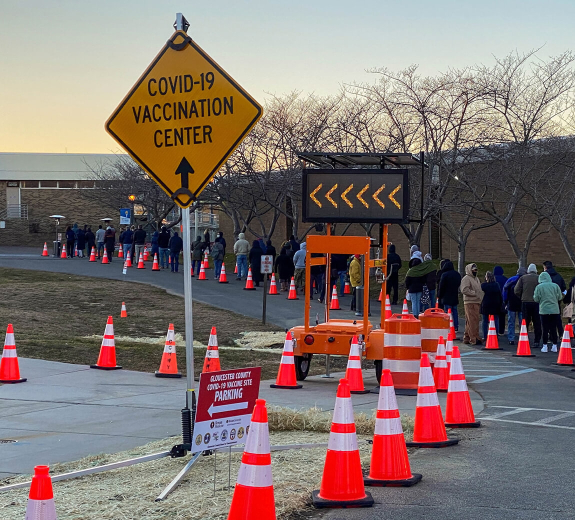“The Omicron variant has many advantages from the virus’ standpoint,” she says. “It’s a lot more infectious and it’s not making people as sick as other variants have. That’s advantageous for the virus because people are out and about spreading the virus without knowing it.”
Additionally, the virus that causes COVID-19 is a type of virus called an RNA virus. RNA viruses are generally more prone to mutations than other types of viruses.
“Influenza is another RNA virus, we see it change a little every year,” Dr. Malhotra says. “So, our vaccines are modified every year and modifications made depending on circulating virus variants.”
Why is Omicron so contagious?
Initial data shows that Omicron mostly infects the upper airways. This means people who are infected with Omicron have many copies of the virus in their throat and nose, whereas people with other versions have more copies of the virus in their lungs.
“Viruses in the upper airways spread much more easily,” Dr. Malhotra says. “Anytime a person coughs or sneezes, large numbers of virus particles from the upper airways can easily project into the air. When other people breathe in that air it causes the virus to spread.”
I keep hearing how Omicron has “an alarming number of mutations” and “at least 50 mutations on the spike protein.” What exactly does that mean?
Having a high number of mutations means that Omicron has several genetic differences from the original version of the virus. Many of these changes are on the spike protein in particular, the part of the virus that protrudes from its surface.
More mutations do not necessarily mean this version of the virus will be more severe or deadly. Initial data shows that Omicron infections are generally less severe than other versions of the virus, though this version is more contagious. And the virus hasn’t changed enough to significantly impact how well vaccines work. The vaccines continue to provide good protection from severe illness and hospitalization. It is key to remain up to date on vaccines and boosters to keep up this protection.
Why can you still get and spread COVID-19 if you’re vaccinated?
Vaccination remains one of the most important things we can do to protect ourselves from COVID-19. While vaccines and boosters significantly reduce your risk of severe illness, they do not completely block the virus from entering your mouth and nose.
When the virus enters your body, your immune system swoops in to fight it off. The vaccine primes your body to recognize the virus and start fighting it off right away. But sometimes, before your body can completely fight it off, the virus may be able to make a few copies of itself. This can cause mild or asymptomatic illness and make it possible to spread the virus.
Should I just get Omicron and get it over with?
Omicron infections are proving to be milder than other forms of the virus, especially among people who are vaccinated and boosted. This has left some people wondering if they should continue to take precautions — or if they should just get infected with this milder form of COVID-19 in hopes of gaining more protection against the virus.
Dr. Malhotra says precautions are still necessary. While people who are vaccinated and boosted are having less severe illnesses, some people — especially unvaccinated people which amounts to more than a quarter of the U.S. population — are still requiring hospitalization.
“While many people experience only mild illness, some people are still being hospitalized — enough to put a strain on our hospitals and create shortages of supplies and staff,” Dr. Malhotra says. “So, if Omicron just sweeps through the population and we don’t try to limit transmission, it will put even more strain on hospitals. And that it's not only going to impact care of patients with Omicron, but also take up resources and beds from patients with other conditions.”
Do we know anything about Omicron and the risk of long COVID? In general, do people who are vaccinated and get the virus experience long COVID?
Long COVID is a condition where people experience COVID-19 symptoms (like fatigue and shortness of breath) for weeks or even months after having the virus. Since Omicron is so new, scientists don’t yet know whether the risks of long COVID are different with Omicron versus other variants. They're working to learn more.
“Early studies are showing that the duration and severity of long COVID generally tend to be worse in patients who had a more severe illness,” Dr. Malhotra says. “People who are vaccinated are experiencing less severe illness and less severe long COVID, which is another big advantage to being vaccinated.”
What does the Omicron variant mean for people who are immunocompromised?
Dr. Malhotra’s biggest message for people who are immunocompromised is to contact their doctor immediately if they experience any symptoms.
“New therapies have become available in recent months that are particularly effective if administered within five days of testing positive or as close as possible to the onset of symptoms,” she says. “The sooner we administer these therapies the better. That’s why it's crucial to test and contact your doctor as early as possible.”
These therapies include:
-
Monoclonal antibodies, proteins that help the body reduce risk for severe disease by binding to the virus and preventing it from invading our tissues. These antibody infusions are being used in the treatment of newly-infected immunosuppressed patients. Those that were active against the older virus variants but not the Omicron variant have been phased out.
-
Antiviral medications, medicines that help stop a virus from spreading in your body by preventing virus replication.
-
Passive immunization, where people can receive a shot of virus-fighting antibodies before they are exposed to the virus. This approach can be done as a preventative measure every few months for people whose immune systems may not make a strong response to the vaccine.





